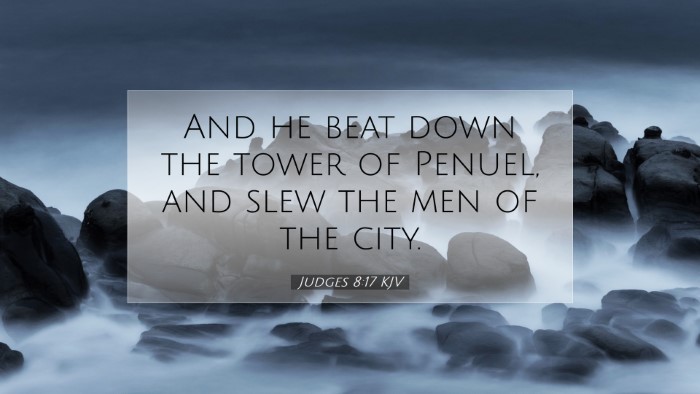Commentary on Judges 8:17
Judges 8:17 reads: "And he beat down the tower of Penuel, and slew the men of the city."
This verse concludes a significant episode in the narrative of Gideon’s military campaign against the Midianites. In this commentary, we delve into various insights drawn from notable public domain commentaries by Matthew Henry, Albert Barnes, and Adam Clarke, to provide a multifaceted understanding of this scripture.
Contextual Background
Gideon, also known as Jerubbaal, was raised by God to deliver Israel from subjugation under the Midianites. In the preceding chapters, we see his faithfulness and strategic prowess in leading the Israelite army. This particular event follows Gideon's victory and highlights a darker turn as he deals with the towns that refused to aid him.
The Significance of Penuel
The city of Penuel (also known as Peniel) holds historical significance. It is located east of the Jordan River and was named after Jacob’s encounter with God (Genesis 32:30). Its position not only made it a strategic military point but also a spiritual one, symbolizing a confrontation with unfaithfulness and lack of cooperation among the Israelites.
Henry’s Perspective
Matthew Henry emphasizes the severity of Gideon's actions at Penuel, noting that Gideon’s response was fueled by the refusal of the city to support him in his battle against the Midianites. For Henry, this action serves as a reflection on leadership and accountability within God's chosen people. Leaders are responsible for rallying their communities towards common goals, especially in times of crisis.
Barnes’ Insights
Albert Barnes offers a more analytical view on the implications of Gideon’s siege of Penuel. He underscores that Gideon's destruction of the tower and the slaying of the men demonstrates the seriousness of rebellion against divine leadership. Barnes points out that this brutal encounter serves as divine judgment upon Penuel’s indifference, suggesting that it is a stark reminder for contemporary believers of the necessity of unity and support in God’s mission.
Clarke's Explanation
Adam Clarke elaborates further on the symbolic nature of the tower of Penuel. He indicates that the tower may represent strength or defense found in human constructs. Gideon's action of demolishing this stronghold symbolizes God's sovereignty over human fortifications. Clarke emphasizes the lesson that reliance should be placed on God rather than on human strength or resources, which can ultimately lead to destruction if misaligned with divine purpose.
Theological Implications
- Divine Justice: This passage showcases the principle of divine justice in action. Those who opposed God’s chosen leader faced dire consequences, suggesting a serious implication for those who defy God’s ordained authority.
- Leadership and Responsibility: Gideon’s actions raise vital questions about leadership within the community of faith. Leaders are accountable not just for their actions but for how they influence those they lead, particularly regarding collective obedience to God.
- God’s Sovereignty: The destruction of the tower highlights the overarching theme of God’s sovereignty over nations, cities, and individuals. Human strength will crumble when it opposes the divine will.
Application for Today
The story of Gideon’s encounter with the inhabitants of Penuel provides several lessons for modern-day believers:
- Collective Support: It illustrates the importance of church and communal support in fulfilling God’s mission. Believers are called to stand together in faith and action.
- Awareness of Opposition: Just like the men of Penuel, individuals and communities may face opposition to God’s commands. Awareness of such dynamics can encourage readiness to respond faithfully.
- Trust in God’s Plan: The necessity of trusting in God’s plan rather than relying on worldly means is a critical takeaway. True strength lies in alignment with God’s purpose, not in visible fortifications.
Conclusion
Judges 8:17 serves as a poignant reminder of the dynamics of faith, leadership, and divine justice through the narrative of Gideon and Penuel. By synthesizing insights from Matthew Henry, Albert Barnes, and Adam Clarke, we find a rich tapestry of theological and practical applications crucial for pastors, students, and theologians alike. The greater message is clear: loyalty to God's leadership is paramount, and the consequences of rebellion remain dire.


